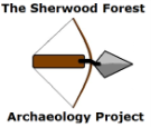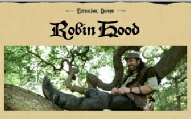Mansfield is situated in the western central area of Nottinghamshire.
In the medieval period it dominated the area as the largest and most important royal manor in the county.
At Domesday 1086, Mansifeld was a crown Manor with two adjoining outliers (berewicks) of Skebgy and Sutton in Ashfield.
'In Mansfield and the outliers Skegby and Sutton King Edward had 3 carucates and 6 bovates of land taxable. Land for 9 ploughs. The King has 2 ploughs in lordship. 5 Freemen with 3 bovates of this land; 35 villagers and 20 smallholders with 191/2 ploughs. 1 mill and 1 fishery, 21s; meadow, 24 acres; woodland pasture 2 leagues long and 2 wide; 2 churches and 2 priests' (Morris 1977).
This was a very large manor indeed.
It held possessions in other manors across the county (sokeland), these were at:
Warsop, Clowne, Carburton, Clumber, Budby, Thoresby, Scofton, Perelthorpe, Rayton, Besthorpe, Carlton on Trent, Kirton, Willoughby, Ompton, Carlton in Lindrick, Tiln, Littleborough, Sturton Le Steeple, Wheatley, Ranby, Walkeringham, Leverton, Fenton, Misterton, Wiseton, Clayworth, Clarborough, Welham, Simetone, Gringley and Saundby...
...and as lo held Berewicks at Edwinstowe and Grimston.
It is the belief of Mike Bishop (former county archaeologist for Nottinghamshire) that the manor once held jurisdiction over the other royal manors of Dunham and Bothamsall, and even once included the lands granted to Archbishop Oskytell in 956 at Southwell and Scrooby in 958 (Bishop 1981).
(See the Archbishop of York and Sherwood Forest story for more info).
There are no confirmed royal visits to Mansfield that come directly from the medieval records, but it seems that Henry I may have stayed twice in his reign (1100-
From the time of his grandson Henry II (1154-
Despite this lack of royal patronage through visiting the manor-
During the 13th century it normally contributed £36. 7s. 6d annually towards the farm of the county paid to the exchequer by the Sheriff (Crook 1984). When the king levied tallage on his demense lands (taxing the directly owned land farmed directly for the king) and boroughs it paid a substantial amount, sometimes nearly as much as the borough of Nottingham itself (ibid).
The men of Mansfield were considered an important grouping, who often petitioned the king directly to maintain the rights and privileges they had as a crown manor.
This reflects the importance of the Manor.
This importance may have a wider impact: one possibility (and it is only a theory) is that the 'Shire' or area of jurisdiction of Mansfield may have been the provider of the name 'Sherwood' when relating to the Forest.
This is certainly one possibility as the term 'Sherwood' only came into use after Henry II began investing heavily in the facilities at nearby Clipstone, and Sherwood Forest became an important focus of royal attention for the next few centuries.
Mansfield, its fields, woods and heathland made up a major part of the 'High Forest' region of Sherwood Forest.
The maintenance of royal control over Sherwood Forest especially in the 'high forest' was certainly reliant on the control of Mansfield, and the area it covered and influenced.
The town of Mansfield itself sat 15 miles due north of Nottingham, and would be approached up the western highway of the forest.
The traveller would pass to the west side of Bestwood park before heading for the Priory at Newstead.
To the north of the priory the landscape that the road passed through was heavily wooded, including woods such as the rather sinister sounding 'Dede Quendale Wode' (Dead Queen's Dale).
The road then crossed (the river) Rainworth Water at 'Gunwey Forth' (ford).
The traveller would then pass by the large mound of Galow Tre Hyl (the town gallows for Mansfield) looming above them to the east side of the road (see Gallows in the Forest? entry for more details).
This rather pleasant landmark welcomed the visitor onto crown lands.
The enormous area of woodland combining Mansfield Wood, Sutton Wood, and the crown woodland of Lyndhurst (see Lyndhurst wood -
These vast tracts of woodland must have provided a haunt for many of the malefactors, robbers, and ne'er-
A part of this woodland that survives, still bares the name 'Thieves Wood'.
The possibility of falling foul of such vagabonds and outlaws must have played heavily on the mind of any traveller in these parts, especially as night approached.
It must have been with some relief that the traveller broke free of the closed canopy of woodland to enter the open fields of 'Berry Field' and 'Southfield' and descended into the hopefully safe haven of the town of Mansfield with its churches, inns and guesthouses.
Mansfield was a bustling market community with the usual people going about their business. Evidence for this comes from the surnames of people in the community with smiths, carpenters, bakers, maltsters, spicers and barkers (leather makers-
The town would be a hive of chaos and activity and energy especially on a market day, and would be a stark contrast to a journey across the wastes and woods of the high forest.
A visitor could take refuge in some of the accommodation available in the town before indulging in some of the local beer, for which Nottinghamshire was rightfully well know.
(Andy Gaunt, first published 01/12/2011)
Click here for more ‘Stories from the Forest’…



Community Archaeology Nottinghamshire, Community Archaeology Derbyshire, Community Archaeology Leicestershire, Community Archaeology East Midlands, Mercian Archaeological Services Community Archaeology for Nottinghamshire, Derbyshire, Sherwood Forest, Leicestershire and the East Midlands. Community Archaeology Nottinghamshire, Community Archaeology East Midlands, Community Archaeology Leicestershire. Archaeological

the King's Royal Manor of Mansfield
Award Winners 2016
for "Engaging people in the heritage, history & archaeology of Sherwood Forest".





Some funders and partners:
World-











Mercian Archaeological Services CIC
Specialists in Community Archaeology, Public Involvement, Research & Training
Community Archaeology Nottinghamshire, Excavation, Research, Volunteering, Community Archaeology Derbyshire, Training, Social, Learning, Community Archaeology Leicestershire, Heritage, Involvement, Belonging, Knowledge sharing, Community Archaeology Lincolnshire, Topographic Survey, Talks and Presentations, Outreach, Archaeology Projects , Open Days, Schools, Finds Processing, Day Schools, Field Schools, Young People, Archaeology and History of Sherwood Forest, Pottery Research, Medieval, Roman, Prehistoric, Community Interest Company, Community Archaeology Nottinghamshire.
Community Archaeology in Nottinghamshire
Community Archaeology in Derbyshire
Community Archaeology in Leicestershire
Community Archaeology East Midlands
Community Archaeology in Lincolnshire
© Mercian Archaeological Services CIC 2013. Registered Business No. 08347842. All Rights Reserved.
The Future of Sherwood’s Past
Project page links:
-
-
-
-
-
-
-
-
The Sherwood Forest
National Nature Reserve Archaeology Survey
-
Long term Research at
King John’s Palace:
Ancient Royal Heart of Sherwood Forest
-
The Sherwood Forest Archaeology Training Fieldschool
-
“Scirwuda-
Ghost and Shadow woods of Sherwood Forest Project
-
Investigating Thynghowe Viking
Meeting Site
-
Searching for the
The Battle of Hatfield
-
-
Fieldswork at St Edwin’s Chapel
-
St Mary’s Norton-
-
Mapping Medieval Sherwood Forest
-
The Sherwood Forest LiDAR
Project
-
Warsop Old Hall
Archaeological Project
-
The Sherwood Villages Project:
Settlement Development in the Forest
-
-
-
Researching Edward IIs fortification at Clipstone Peel
-
-
-
-
The Cistercians of Rufford Project:
Settlement Development, Dynamics and Desertion.
-
Sherwood Forest Environmental Survey
-
World War II in Sherwood Forest -
-
World War I in Sherwood Forest -
-
About Medieval Sherwood Forest
-
Robin Hood and Sherwood Forest
-
-
-
-
-
-
-
-
-
-
-
-
Project page links:
-
-
-
-
-
-
-
-
The Sherwood Forest
National Nature Reserve Archaeology Survey
-
Long term Research at
King John’s Palace:
Ancient Royal Heart of Sherwood Forest
-
The Sherwood Forest Archaeology Training Fieldschool
-
“Scirwuda-
Ghost and Shadow woods of Sherwood Forest Project
-
Investigating Thynghowe Viking
Meeting Site
-
Searching for the
The Battle of Hatfield
-
-
Fieldswork at St Edwin’s Chapel
-
St Mary’s Norton-
-
Mapping Medieval Sherwood Forest
-
The Sherwood Forest LiDAR
Project
-
Warsop Old Hall
Archaeological Project
-
The Sherwood Villages Project:
Settlement Development in the Forest
-
-
-
Researching Edward IIs fortification at Clipstone Peel
-
-
-
-
The Cistercians of Rufford Project:
Settlement Development, Dynamics and Desertion.
-
Sherwood Forest Environmental Survey
-
World War II in Sherwood Forest -
-
World War I in Sherwood Forest -
-
About Medieval Sherwood Forest
-
Robin Hood and Sherwood Forest
-
-
-
-
-
-
-
-
-
-
-
-